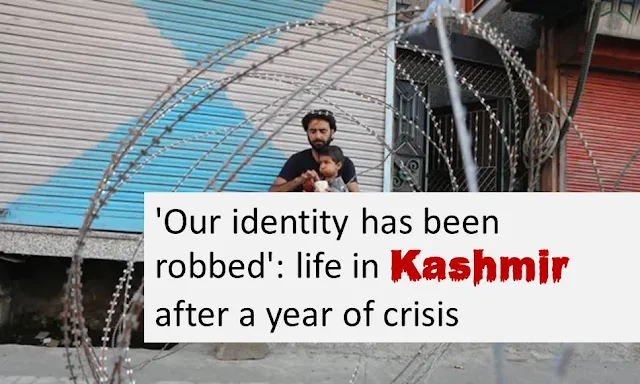'Our identity has been robbed': life in Kashmir after a year of crisis (theguardian)
On 5 August 2019, India revoked the Muslim-majority territory’s semi-autonomous status and began a devastating crackdown
For the past year, Fayaz Tilgami’s poetry has spoken of nothing but loss: a lost home, a lost language, a lost world. “We have lost our existence; it has been snatched from us,” said the 70-year-old Kashmiri poet, his voice heavy with sorrow.
A year ago, on 5 August 2019, the Indian government, led by prime minister Narendra Modi, repealed article 370 of the Indian constitution. For almost 70 years, the provision had given the disputed, majority-Muslim state of Jammu and Kashmir a semi-autonomous status, with special powers over issues such as jobs and residency. The special status had been granted to Kashmir in exchange for joining the Indian union after independence in 1947.
In one fell swoop, everything changed. With a swift presidential order, the Himalayan region was brought under the full control of the Hindu nationalist Bharatiya Janata party (BJP) government and split into two union territories, no different from any other Indian state. Its politicians were imprisoned, phone services were suspended, an internet blackout was imposed and thousands of Indian military troops moved into the region to enforce a strict crackdown, which has still not been fully eased. Journalists reporting on the situation in Kashmir continue to be questioned and arrested under anti-terrorism laws.
“It is not merely our land but it is also our identity which has been robbed,” said Tilgami. He described the repeal of article 370 as an “extreme disaster” that had left the whole region in a state of paralysis. “Our tongues, our pens have been sealed,” said Tilgami.
The repeal of article 370 was justified by the Modi government on the grounds of bringing economic prosperity to the turbulent region, opening it up to outside investment, and eliminating Pakistan-supported militants. “Repealing article 370 shut the gateway to terrorism,” claimed the home affairs minister, Amit Shah.
Yet residents of Kashmir have instead found themselves living in a region far more volatile, unstable and economically fragile than ever. The impact of the crackdown, in particular a six-month internet shutdown, led to huge economic losses and unemployment and cost the Kashmiri economy an estimated $5.3bn (£4bn) – a situation only worsened by the coronavirus lockdown that followed.
The Indian government did little to encourage economic prosperity other than to change strict domicile rules, which had previously prevented non-Kashmiris from buying land, property and investing in the region. Non-Kashmiris have been granted residency in the state since last August.
Read on Source

إرسال تعليق